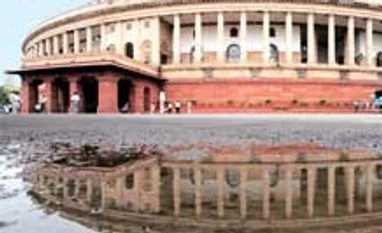Will joint sessions of Parliament become norm?
BJP has just 42 of 250 seats in Upper House and can bank on 20 more from partners, but is still well short of a majority
)
Sixty-six Bills are pending in the Rajya Sabha of which 60 originated in the Upper House and will be in the first round of the legislative agenda of the new government.
Top sources in the Rajya Sabha secretariat said the calendar of Parliament (see box) dictates that the Budget must be passed by July 17 since the Vote on Account taken by the previous government is valid only till July 31; After that it would not be possible to pay government salaries unless the new government took another Vote on Account or presented a Budget. In 2009, then Finance Minister Pranab Mukherjee had presented the Budget on July 7.
About joint sessions of Parliament becoming the norm in the new government, Rajya Sabha secretariat sources were sceptical. The instrument of a joint session – where both Houses come together and pass a Bill – arises only and only if one House has rejected a Bill that the other House has passed. This has happened only thrice in the history of independent India.
Also Read
| PARLIAMENTARY CALENDAR |
|
“With the institution of the Standing Committees — where members of both Houses and almost all parties scrutinise all legislation before it comes to the House — the possibility of agreement in the committee but disagreement on the floor of the House has been rendered irrelevant. So, if the government thinks it can use a joint session as a stratagem to push Bills in the two Houses to overcome its lack of majority in the Upper House, it is making a mistake. This cannot happen,” said a source.
The BJP has just 42 of the 250 seats in the Rajya Sabha. It can also count on 20 other votes from alliance partners. But it is still well short of a majority.
The Congress, which won just 44 seats in the Lower House, has 68 members in the Upper House. The BJP’s lack of numbers will be made up over a period of time but six vacancies will arise immediately — where sitting Rajya Sabha MPs will have to vacate seats because they have won the Lok Sabha elections.
The six are: Ramvilas Paswan (LJP),Tariq Anwar (NCP), Rajiv Pratap Rudy (BJP), Ram Kripal Yadav (BJP), Faggan Singh Kulaste (BJP), and Bhagat Singh Koshiyari (BJP).
More From This Section
Don't miss the most important news and views of the day. Get them on our Telegram channel
First Published: May 23 2014 | 12:49 AM IST
